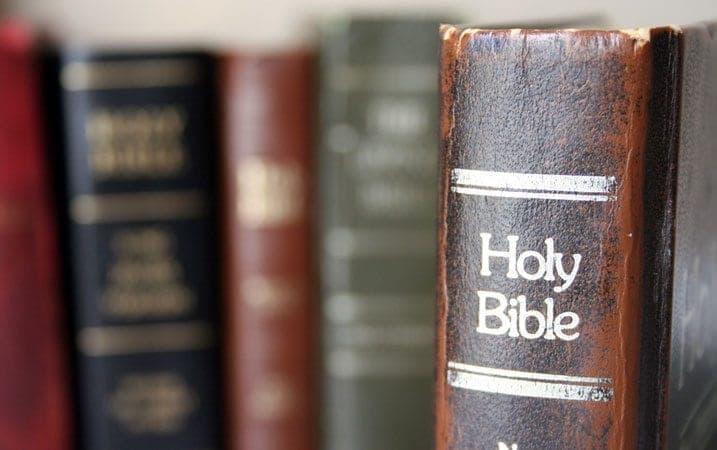If a group of Tennessee lawmakers have their way, the Bible is set to become the state’s official book.
By a vote of 19 to 8, the state senate passed HB0615 Monday, which would dub “the Holy Bible as the official state book.” Supporters say the measure recognizes the book’s unique role in American history. But opponents, including some Catholic leaders, say the move could make people of non-Christian faiths feel slighted.
“As a Catholic, as a Christian, we believe the Bible is the inspired word of God, but I also recognize that we live in a pluralistic society and we have a mixture of different faiths,” said Bishop Richard Stika of the Diocese of Knoxville.
Making the Bible Tennessee’s official book could “cause division within the state,” he warned, noting that he doesn’t need a state proclamation to realize the Bible is an important book.
He said the state should respect all faiths, “without saying this one is more important than that one.”
According to the Pew Research Center, 81 percent of adults in Tennessee are Christian, with about 6 percent of the population Catholic.
Controversy between Catholics and Protestants in the United States over the public role of the Bible is nothing new.
Catholic immigrants arriving to U.S. shores by the millions in the 19th century were greeted with disdain by Protestant America, and public schools were no different. Prayer was ubiquitous, including scripture readings.
Catholic parents were upset that so-called “Protestant Bibles” were being used, and, encouraged by clergy, opened up their own schools, leading to the creation of the nation’s largest private school system.
The U.S. Supreme Court ruled in 1962 that prayer in public schools was unconstitutional and prohibited readings from the Bible in schools the following year.
In addition to differences in translation, Catholic and Protestant Bibles contain different numbers of books. Both have 27 books in the New Testament, but Catholics include seven more books in the Hebrew Bible, or Old Testament. (They are: Tobit, Judith, 1 and 2 Maccabees, Wisdom, Sirach, and Baruch.)
The bill does not say which version of the Bible would be the state’s official book, which also worried Stika.
“There are different translations, some are more scholarly than others. That scholarship is important because of how it is interpreted,” he said. “If the governor signs, which Bible will it be? That is a concern. It just causes confusion.”
Christopher Hale, executive director of the Washington, DC-based Catholics in Alliance for the Common Good, said he wishes lawmakers in his home state would focus on passing laws that are aligned with Gospel values rather than outward displays of the faith.
“If the Tennessee legislature wants to honor the Bible, instead of naming it the state book, they could do a better job of following the teachings in it,” Hale said.
“In Scripture, Jesus tells us that God will judge us by how we treat the poor. If that’s the case, how is the legislature’s refusal to expand healthcare coverage to the state’s poorest residents reflecting a strong devotion to biblical principles?” he continued.
The bill now heads to Gov. Bill Haslam, who said he opposed the measure but has not announced if he would veto it.
“The Bible is the most important book in my life, and I think in the world,” he said last week. “But that’s very different than being the state’s official book.”
The bill was introduced by Republican state Sen. Steve Southerland, who argued that the Bible is of historical importance, trying to sidestep those who say the measure amounts to state-support for one religion over another.
Other opponents said the bill undercuts the sacred nature of the text.
“The Bible is a book of history, but it’s not a history book to be placed on a shelf. It’s to be lived out in the lives of believers,” said state Sen. Ferrell Haile, a fellow Republican who voted against the measure.
Authorities in Tennessee said they believe the bill violates the US constitution. Haslam has 10 days to decide whether to sign the bill.














